The Bard of Springfield: An Analysis of Four Shakespearean References in The Simpsons

The Simpsons has, over the years, garnered a fan base that is attracted by the pointed social satire, astute writing, and the constant stream of intelligent references to our wider culture. Be it art, music, literature, history or celebrity, The Simpsons’ writing staff has left no aspect of our rich culture alone in their pursuit of humour.
It is therefore unsurprising that one of the most iconic of our cultural figures, William Shakespeare, has been regularly alluded to throughout the 25 seasons of the show. The references are many and varied. From single lines of quoted text to entire interpretations of a play, the writers have drawn on The Bard of Avon a number of times and to great effect. The Shakespearean Springfield is irreverent, insightful, satirical, and above all, hilarious.
Here are four worth noticing…
1. A Star is Burns – Season 6 Episode 18

The episode where Springfield decides to hold a film festival is also where you will hear some lines from Othello. Barney’s entry into the competition is well remembered by fans. The film has distinctive art-house black and white visuals, the haunting music of Un Bel di Vedremo, and his poetic lines, including:
Barney: ”There’s a line in `Othello’ about a drinker:
`Now a sensible man, by and by a fool, and presently a beast.’ That pretty well covers it.”
The quoted words are Cassio’s, from scene ii of Act III. As a victim of Iago’s manipulations throughout Othello, Cassio is convinced to get drunk and, suffice to say, makes a few mistakes. The poetry of Shakespeare’s words illuminate the drunk’s regret – an awareness of what you become when you imbibe too much: a ‘beast’ and a ‘fool’. The function of the lines in this episode is to further enhance the pseudo-highbrow, almost philosophical nature of Barney’s film. In turn, what this does is exacerbate the hilarity of the irony at work. This is Barney Gumbel – the most unsophisticated of Springfield’s denizens. He does not possess that kind of sophistication and, in fact, does not even seem aware that he made the film in the first place! ‘I made a movie?’ he cries, as it begins to roll.
Including these lines from Othello is a great satire on how many artists and intellectuals appropriate Shakespeare’s words for their own. They use them because such words can instantly infuse their work with poetry, a poetry that can elevate works that are lesser to a higher level purely by appropriation. Ken Keller, the writer on this episode hands Cassio’s lines to the town drunk, Barney, with his tongue firmly planted in his cheek.
2. The Principal and the Pauper – Season 9 Episode 2

This much maligned episode is well known for exposing Principal Seymour Skinner as a fraud. Armin Tanzarian – his real name – is revealed to all, as is his rebellious past. The fallout from this revelation makes up the bulk of the narrative. The episode clearly deals with questions of appearance and reality, and the writer, again Ken Keller, evidently saw an opportunity to include one of the most famous lines on the matter:
Lisa: I admit Sergeant Skinner seems okay, but Mr. Tanzarian pulled himself up from the streets and earned our respect and admiration.
Bart: What about his name?
Lisa: His name doesn’t matter. “A rose by any other name would smell as sweet.”
Bart: Not if you called them stench blossoms.
Homer: Or crapweeds.
Lisa, as befits her character, draws on the great poetic truth in Shakespeare’s language. Taken from Act II, scene ii of Romeo and Juliet, this beautiful aphorism teaches us that names are arbitrary; they are superficial labels and give no true clues to the reality of a person or object. Bart and Homer, ignorant and irreverent as ever, destroy the argument easily (at least in their minds). Their words leave us chuckling but also thinking about how true their words are.
3. Guess Who’s Coming to Criticise Dinner? – Season 11 Episode 3
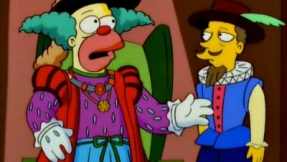
Homer becomes a notorious food critic in this season 11 episode penned by Al Jean. As homer is earning his stripes on the review scene, he and Lisa end up at a dinner theatre where King Lear is being performed. Who should be playing the lead role? Springfield’s ubiquitous entertainer: Krusty.
In what one can see as a satire of how our real world celebrities commonly take on a Shakespearean role when they look to ‘tread the boards’, Krusty takes on the demanding role of Lear. And much like how some of our real world stars struggle to deliver on these roles, Krusty struggles here. Firstly, he seems to be woefully under prepared:
Actor: Lord, thy daughters Goneril, Regan and Cordelia.
Krusty: [as King Lear] What is this Merry Old England or Petticoat Junction? [boos and hisses from the audience]
Krusty: Hey, lighten up, it’s a comedy!
Actor: [whispers] No it’s not
Krusty: It’s not?!
After flicking through the script, Krusty decides to ‘punch it up on the fly’, claiming that Shakespeare’s material ‘stinks.’ He then rattles of a few jokes, one a poor pun on King Lear’s name and the other a clanger of a knock-knock joke about Romeo and Juliet. After the crowd begins booing him he incredulously exclaims ‘Ooh. Tough crowd. They’re booing Shakespeare!’ While it is very funny to see Krusty floundering on stage, it is even funnier to think about how disbelieving he is. He thinks that purely by playing Lear he inherits the credibility that automatically comes with Shakespeare. He does not even deliver a single actual line from the play. This scene brilliantly points a mocking finger not at the play itself, but at those who would unthinkingly and arrogantly take on Shakespearean roles.
As the classic Simpsonian spinning paper hilariously states: ‘Krusty: Worst King Lear in 400 Years.’ Ouch.
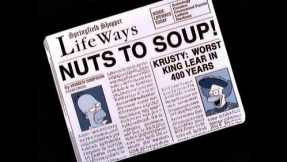
4. Tales from the Public Domain – Season 13 Episode 14
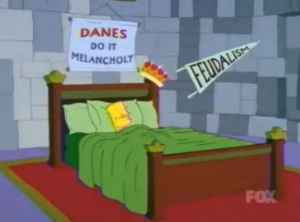
Unsurprisingly, this episode features the most well-known use of Shakespeare’s work in the show’s history: a brilliantly satirical retelling of Hamlet. It is unsurprising because of how well it is done. Bart takes on the role of Hamlet, whose uncle Claudius, played by Moe, has taken the throne of Denmark from Hamlet’s father – Homer. Gertrude becomes Marge, Ophelia becomes Lisa, and many of the other characters find their counterparts in the play.
Unlike previous episodes on this list, where Shakespeare’s words have been used to make fun of the characters or as tools of social satire, here the joke is not only on the characters, but on the text as well. The writer’s begin to irreverently mock Shakespeare from the outset. Before we are launched into the world of the play Bart states that ‘these old stories can’t compare with our modern super writers. Steven Bochco could kick Shakespeare’s ass!’ Bochco is most famous as a writer and co-creator of the hit show NYPD Blue. Such a claim is flattering to Bochco but is, of course, absurd. The joke sets the tone for what is to follow.
We begin with Homer, as the ghost of Hamlet’s father, explaining the situation to his son. He has been poisoned by Moe and Moe has married Gertrude (Marge); young Bart must avenge him. Bart’s reaction, ‘Yeah, that was quite a weekend’, dismissively underlines the absurdity of the plot and perhaps nods to those who might find Shakespeare’s narratives unbelievable and convoluted at times.
Trying to fit Shakespeare’s longest play into about five minutes required the writers to accelerate to the ‘play within the play’ scene in Act III scene ii. During this part, in the real version of Hamlet, a visiting troupe of actors put on a play at the castle, directed by the young prince Hamlet himself, in order to catch the ‘conscience of the king’. The play will mirror the events of Claudius’ poisoning of the former king so closely as to fill him with overwhelming guilt, and, hopefully, drive him to a confession. The writers also use this as a chance to mock a key feature of Shakespearean drama – the soliloquy.
Bart: Aha! Methinks the play’s the thing wherein I’ll catch the conscience of the king.
Moe: Catch my conscience? What?
Bart:You’re not supposed to hear me. That’s a soliloquy.
Moe: Okay, well, I’ll do a soliloquy, too. (CLEARS THROAT) Note to self. Kill that kid.
The Simpsons writers do a great job of sending up this famous sequence. The players are the usual Springfieldian entertainers: Krusty, Sideshow Mel and Mr.Teeny. They turn the play into an improv night, asking for a location, an occupation, and an object. They end up with a castle, a usurper to the throne, and ear poison courtesy of Bart’s shouted suggestions. Moe predictably reacts poorly, blurting out that he ‘didn’t use that much poison!’
We are then accelerated through to Bart killing Polonius (Chief Wiggum) and incurring the wrath of his son, Laertes, here played by Ralph. Ralph is a great choice and his naive, childish personality shines through:
Ralph: Daddy’s stomach is crying.
Wiggum: Laertes, I need you to do a special, big boy job for Daddy. I need you to avenge my death.
Ralph: I like revenging! I’m gonna kill Hamlet.
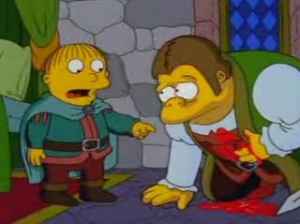
In this adaptation of the play the climax is even more murderous than the source material. Moe has poisoned everything in sight in order to kill Bart, including the drapes and, absurdly, ‘Rosen-Carl’ and ‘Guilden-Lenny’ have also been coated in poison. In a move, typical of the characters they both are, and are standing as proxies for, they high five, dying of the poison as a result. This is possibly my favourite joke in the whole adaptation. Obviously it is funny because they high five knowing that they are covered in poison; it is funnier knowing that in the real version of the play they die in a very poetically just manner. After having spied on Hamlet for his Uncle, pretending to be his friends, they are then tasked to deliver him to his death by Claudius, which they do so happily. In a poetic turn of events Hamlet has them executed in his place. The Simpsons has them simply die from a high five! Perfect.
The deaths keep coming. Ralph kills himself with his own ‘practice stab’; Moe is killed by Bart, and Marge kills herself after seeing the mess around her. We are pulled out of the world of the play and back to the Simpson family home where the writers continue their satirical take on the play:
Lisa: And that’s the greatest thing ever written.
Bart: Are you crazy? I can’t believe a play where every character is murdered could be so boring!
While contentious, Hamlet is considered by many to be the greatest text ever written. What The Simpsons does is boil down this great text, stripping away the powerful, serious themes of death, uncertainty, and misogyny. In its place the writers insert their own familiar characters, their version of pointed, humorous satire, and their own irreverent tone. Showing us that even the most serious literature can be a source of humour.
Some Conclusions
Like a lot of the references in The Simpsons part of the enjoyment is just in ‘getting them’, having that moment of satisfaction when you realise what the writers are alluding to. The references explored above do, on a basic level, fulfil this criteria. They also serve more complex purposes, such as exploring the humour inherent in the juxtaposition of Shakespeare’s poetic words and the show’s not-so-poetic characters. Beyond this, the writers have shown that they can use the aphoristic nature of some of his greatest lines to further develop a key thematic point. The Bard’s words can become tools of satire too, lampooning those in our real world who use and sometime misuse them. lastly, Shakespeare’s work can be the target of the derision itself, with the writers mocking both the content and conventions. The Simpsons writing staff will surely look to draw on Shakespeare’s rich canon for years to come.
What do you think? Leave a comment.
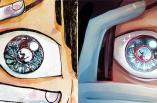
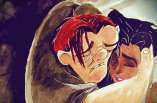



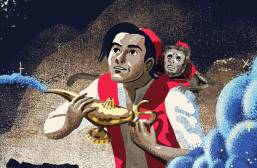

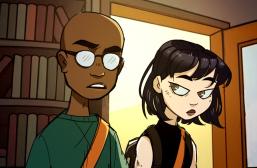



It amazes me how Shakespeare can incorporate itself to pop culture like The Simpsons, The Family Guy, and The Cleaveland Show. The humor and modernity of these shows are a perfect mix to Shakespeare’s old english and people’s perception of Shakespeare.
Thanks for the insights! Playful homages to the man and his works! Although I haven’t really researched on the other shows like Family Guy and what not, The Simpsons’ take on Shakespeare is really well done.
Thanks for reading. It would be interesting to see what other shows, such as Family Guy or American Dad have in the way of Shakespearean references.
Homer is the modern day Hamlet.
Why?
Cool article. Thanks for piecing together all these nuanced references — I know this can be a subtle show. Also, “Tales from the Public Domain” is gold.
Thanks for reading. Yeah, the episodes where the writers employ “Tales from…” are always interesting. While they aren’t as well known as the Treehouse of Horror episodes, they always offer a good satire of something historical or cultural.
Students are encouraged to read in school a lot and it is focussed on in various subjects. The Simpsons is excellent to study, it represents todays society and allows children explore the way people are perceived by the media and the world around them. Also it gives children an insight into irony and comical ways of getting messages across.
Shakespeare, while brilliant and definitely needs to be taught, will not help many children in modern society. The Simpsons captures children’s attention in a way that makes learning easier.
The Simpsons as Macbeth, hmmm I guess it is the only way to get the youth to learn about the classics
I am a teacher and would love to use some of these episodes in my English class to introduce Shakespeare to my 7th graders!
Great idea. I’m a teacher too, and I found a lot of success showing The Simpsons when I taught A Street Car Named Desire. The students felt good about getting the references to the text and understanding why they were funny. The show does a parody of MacBeth too – I’m kicking myself for not including it in my article.
I had not realized that The Simpsons paid tribute to Shakespeare at all. Admittedly while I watched the show in the 90’s a bit I never fully fell in love with it (possibly because its been around for so long). This does make me want to come back to the show that defines an animation era.
The Golden Era of the show was in season 2-8.
Thanks so much for this article! Excellent read and fascinating – I’d never realized how much The Simpsons has done in terms of satire and Shakespeare is one of my favorite things.
I’m glad you enjoyed it. Thanks for all the feedback by the way.
Good analyses of these episodes, some of them are very memorable.
I like plays. The good ones. Shakespeare… I like Titus Andronicus the best – it’s sweet. Incidentally, did you know that you’re taking to an artist? –
The Exorcist III